You’ve meticulously assembled your pedalboard, invested time refining your amplifier’s speaker setup, and curated a guitar collection to cover diverse musical styles. But have you given equal consideration to the unsung hero connecting them all? While often overlooked, the best guitar cables are indispensable for any guitarist serious about their sound.
Those budget-friendly cables online might seem appealing, but they often compromise your carefully sculpted guitar tone with unwanted noise. Not to mention, the connectors on these cheaper options are prone to failure. Upgrading to a quality guitar cable not only elevates your tone but also saves you from the mid-performance frustration of troubleshooting a faulty connection. We’ve all been there.
For those seeking the absolute pinnacle of cable performance, the Mogami Gold guitar cables stand as the gold standard. While a premium investment, their reputation among professional guitarists is well-earned. If the Mogami Gold series stretches your budget, excellent quality and durability are still within reach. Ernie Ball Braided cables offer exceptional sound and resilience without breaking the bank.
Our team has rigorously tested countless cables across various scenarios – from home practice to professional studio recordings and live performances. We’ve compiled a comprehensive FAQ section at the end of this guide, drawing upon our expert knowledge to address common questions before you make a purchase. If you’re eager to explore our product recommendations directly, simply scroll down.
Best Overall
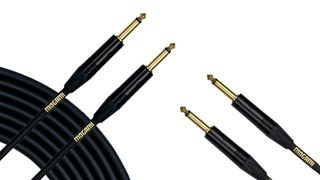 Four connectors for Mogami guitar cables with a coiled section in the corner
Four connectors for Mogami guitar cables with a coiled section in the corner
If you demand the absolute best, Mogami Gold cables are the definitive choice. (Image credit: Mogami)
1. Mogami Gold Series Guitar Cable
The best guitar cable available today – the industry benchmark
Expert Review:
Specifications
Features: Oxygen-free copper conductor, carbon-impregnated PVC, Neutrik black and gold plugs, ultra-high density spiral shield, conductive polymer sub-shield, lifetime warranty, 130pF/m capacitance
Connection: 1/4” straight-to-straight / straight-to-right-angle
Length: 3-25ft
Reasons to Buy
- Exceptional noise rejection
- Lifetime warranty
- Wide range of lengths
Reasons to Avoid
- Premium price point
The Mogami Gold Series guitar cable is engineered with an ultra-high density (UHD) spiral shield and a conductive polymer sub-shield. This advanced shielding effectively eliminates noise and ensures pristine signal integrity, a claim validated by our extensive testing. A conductive carbon-impregnated PVC layer further minimizes microphonic interference commonly encountered with lower-quality cables.
Despite its heavy-gauge copper core conductor, the Gold Series cable remains remarkably flexible and easy to manage, crucial for gigging musicians and studio setups alike. For live performers, the Gold Series Silent option, equipped with Neutrik silent plugs, allows for instrument changes without amplifier noise interruptions.
Backed by an unconditional lifetime warranty and available in various lengths, the Mogami Gold Series cable represents a commitment to uncompromising quality. While potentially exceeding the needs of some players, for those who prioritize premium performance, it simply doesn’t get better.
Best on a Budget
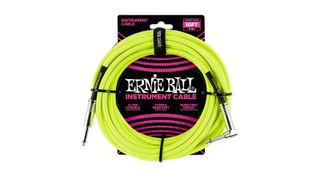 An Ernie Ball Braided guitar cable
An Ernie Ball Braided guitar cable
Ernie Ball cables offer exceptional quality at an accessible price point. (Image credit: Ernie Ball)
2. Ernie Ball Braided Guitar Cable
The Top Guitar Cables for touring musicians seeking value
Expert Review:
Specifications
Features: Dual conductors, tangle-resistant braided jacket, 99.95% oxygen-free copper conductors for corrosion resistance, dual-shielded, dual-conductor design
Connection: 1/4” straight-to-straight / straight-to-right-angle
Length: 10-25ft
Reasons to Buy
- Highly durable construction
- Tangle-resistant design
- Effective noise-free performance
Reasons to Avoid
- Limited shorter length options
Ernie Ball’s reputation for durability extends to their entire guitar cable lineup, but the Braided models are specifically engineered for exceptional robustness and tangle resistance. This makes them ideal for guitarists frequently on the road or those who prioritize quick, hassle-free cable management in gig bags.
Internally, dual conductors ensure transparent transmission of your guitar’s tone. Our tests revealed clear highs, focused mids, and rich harmonic content. The internal shielding effectively minimizes noise and preserves signal strength.
While length options are somewhat limited, Ernie Ball Braided cables are available in practical 10, 18, and 25ft lengths, catering to most stage and studio requirements.
Best for Options
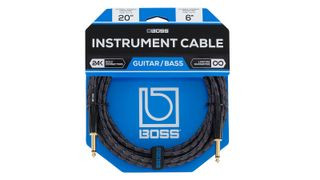 A Boss guitar cable in its blue packaging
A Boss guitar cable in its blue packaging
Boss instrument cables deliver a wide array of length choices for diverse setups. (Image credit: Boss)
3. Boss Instrument Cable
A leading guitar cable offering a balanced blend of quality and value
Expert Review:
Specifications
Features: Studio-grade, oxygen-free copper core wire, 24K gold-plated contacts, heavy-duty braided shield
Connection: 1/4” straight-to-straight / straight-to-right-angle
Length: 1-25ft
Reasons to Buy
- Extensive range of lengths
- Excellent value for money
- Robust and reliable
Reasons to Avoid
- Lacks premium, high-end features
Boss instrument cables strike an impressive balance between quality and affordability. Constructed with quality materials, these cables immediately convey a sense of durability and maintain your guitar’s inherent tonal characteristics.
Featuring heavy-duty shielding, they effectively block unwanted microphonic noise. The connectors provide a secure and reliable connection to the cable. The cable’s material also facilitates easy coiling, contributing to long-term durability with proper care.
Available in a comprehensive range of lengths and angled jack options, Boss instrument cables provide versatility for various setups. In our experience, they represent exceptional value, making them a top contender among the best guitar cables for the money. For those seeking ultimate high-end performance, Boss also offers a premium cable range.
Also Consider
While our top recommendations cater to most guitarists’ needs, if you require more specialized features, explore these excellent alternatives:
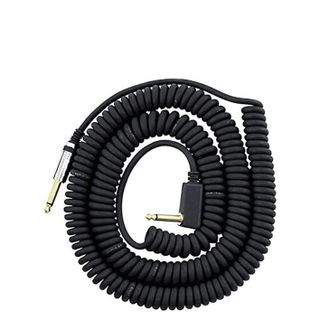 A Vox Premium Vintage Coiled cable
A Vox Premium Vintage Coiled cable
Best Coiled
4. Vox Premium Vintage Coil
Connection: 1 x 1/4″ straight, 1 x 1/4″ right-angle jack
Length: 30ft (9m)
Pros:
- Iconic vintage aesthetic
- High-quality cable construction
- Excellent build quality
Cons:
- Coiled cables may not suit all styles
For guitarists drawn to vintage aesthetics, a coiled guitar cable from Vox is a quintessential choice. Despite some guitarists and audiophiles criticizing coiled cables for perceived sonic compromises, this Vox cable dispels those myths.
The key lies in Vox’s choice of wire: 99.9% purity oxygen-free copper. This delivers a pleasing, pronounced midrange frequency, contributing significantly to the sought-after vintage tone. The cable is robustly built, incorporating dual shields to enhance strength and minimize noise and interference. While the coiled look might not appeal to everyone, for players embracing a vintage vibe, this cable is unmatched.
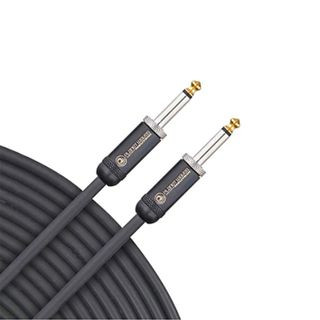 A D’Addario Planet Waves American Stage Cable
A D’Addario Planet Waves American Stage Cable
Best for Live Performance
5. D’Addario Planet Waves American Stage
Features: 22 gauge oxygen-free copper twisted pair conductors, 95 percent tinned copper braid shielding, Geo-Tip plugs, approx 92pF/m capacitance
Connection: 1/4” straight-to-straight / straight-to-right-angle
Length: 10-30ft
Pros:
- Geo-Tip plugs for enhanced connection
- Low capacitance design
Cons:
- Limited outer jacket options
- Not ideal for ultra-premium applications
Planet Waves’ patented Geo-Tip plugs are a standout feature of this exceptional guitar cable. Manufactured by Neutrik in Liechtenstein to Planet Waves’ exacting specifications, these plugs feature a slightly flattened tip and extended shield, ensuring a snug, noise-free connection with virtually any guitar jack. The tinned-copper braid effectively shields against unwanted signal interference.
HelioFused soldering, another Planet Waves innovation, creates a robust 180-degree inline connection, making the American Stage cable exceptionally durable and stage-ready. Affordable and widely available in straight and right-angled configurations, this cable is a reliable choice for live performance.
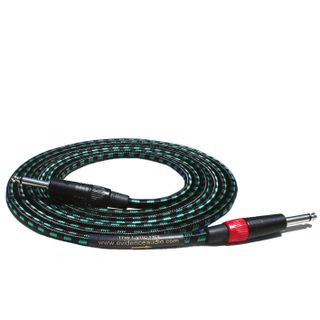 An Evidence Audio Lyric HG guitar cable
An Evidence Audio Lyric HG guitar cable
Best Durability
6. Evidence Audio Lyric HG Guitar Cable
Features: Dual solid-core conductors made of refined IGL copper, braided copper shielding, and a tough nylon/rubber outer jacket
Connection: 1/4″ phone plug on the input side and a straight plug on the output
Length: 10-20 feet
Pros:
- Noticeably pure signal path
- Incredibly robust construction
- Expertly crafted
Cons:
- Very expensive
The Evidence Audio Lyric HG is favored by discerning players like David Gilmour, Jeff Beck, and John Mayer for good reason. Its design incorporates dual solid-core conductors made of refined IGL copper, resulting in a demonstrably cleaner and more transparent signal path compared to standard multi-strand cables. While the solid-core construction makes it slightly less flexible, the braided copper shielding and rugged nylon/rubber outer jacket ensure years of reliable performance.
The Lyric HG represents a significant investment, but our testing confirms its exceptional value. The quality is truly second to none, and its adoption by top-tier musicians speaks volumes.
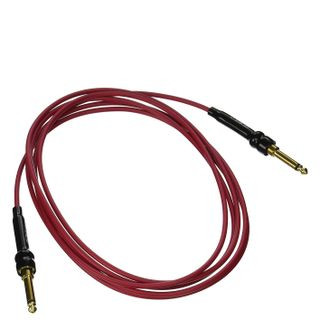 A George L’s .155 cable
A George L’s .155 cable
Best Lightweight
7. George L’s .155 Guitar Cable
Features: Solder-less connection, George L’s .155 connectors, high-density braided shielding, 67pF/m capacitance
Connection: 1/4” straight-to-straight / straight-to-right-angle
Length: 10-20ft
Pros:
- Low capacitance for optimal tone
- Lightweight and durable
Cons:
- Premium price for solder-less system
- Thin cable might not be preferred by all
George Lewis is renowned for offering his .155 cable in bulk, enabling guitarists to create custom cables using his solder-less connector system. His cables are also celebrated for their exceptionally low capacitance. Eric Johnson is a notable advocate. It’s challenging to find another guitar cable on the market with a lower capacitance per meter. The frequency response is outstanding, and the signal shielding is highly effective.
Pre-assembled versions come equipped with George L’s solder-less .155 connections. Despite the vintage-inspired thinness of the cable and its tendency to coil, it possesses surprising toughness. For players who find the .155 gauge too slender, the .255 version delivers identical sonic performance with a thicker, heavier cable.
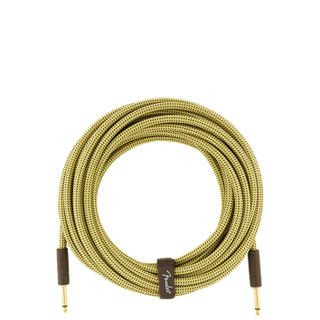 A Fender Deluxe Series Instrument Cable
A Fender Deluxe Series Instrument Cable
Best Warranty
8. Fender Deluxe Instrument Cable
Features: 24K gold-plated connectors, 20 AWG 99.99 percent oxygen-free copper conductor, 95 percent braided oxygen-free copper shielding, molded plugs with strain relief, yellow or black tweed outer jacket, hook-and-loop cable tie
Connection: 1/4” straight-to-straight / right-angle
Length: 5-25ft
Pros:
- Excellent value with a lifetime warranty
- Includes a cable tie
Cons:
- May not appeal to those seeking boutique options
- Tweed jacket might not suit all tastes
Fender’s Deluxe Series guitar cables often fly under the radar, but their lifetime warranty and robust construction make them a high-performance option at a competitive price. Custom-molded plugs with integrated strain relief ensure a solid connection, while the shielding rivals more expensive cables in noise rejection.
These cables are a substantial 8mm in diameter yet coil neatly and include a cable tie for organized storage. To our ears, the Fender Deluxe cables offer a bright and transparent tone, particularly the 10-foot version, and feel durable enough for demanding touring conditions. A well-deserved inclusion in our best guitar cables guide.
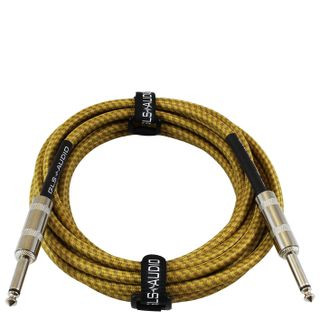 A GLS Audio Tweed guitar cable
A GLS Audio Tweed guitar cable
Best Vintage Style
9. GLS Audio Tweed Guitar Cable
Features: Triple-strain relief, oxygen-free copper conductor, oxygen-free copper shielding, conductive PVC shield, plastic conductive carbon shield, approx 125pF/m capacitance, brown or black tweed jacket
Connection: 1/4” straight-to-straight / straight-to-right-angle
Length: 6-20ft
Pros:
- Low capacitance for clear tone
- Bright and articulate sound
Cons:
- Tweed aesthetic might not be universally appealing
Direct purchases from GLS Audio offer significant savings on these guitar cables, often priced around $60 at various retailers. The tweed outer jacket exudes vintage charm in both black and brown, and the GLS Audio Tweed cable feels premium: it coils well, is durable, and is irresistible for vintage enthusiasts.
The cable features double shielding and low capacitance, ensuring quiet operation without compromising high-end frequencies. Straight-to-straight and straight-to-right-angle formats are priced the same. In our testing, the GLS Audio cable delivered a remarkably accurate and full-bodied reproduction of your guitar’s tone. For its price point, the performance is exceptional compared to other brands in the same range.
How to Look After Your Guitar Cables
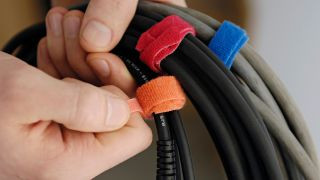 A man holds guitar cables with velcro ties on them
A man holds guitar cables with velcro ties on them
(Image credit: Future)Proper cable care is essential. Investing in the best guitar cables is pointless if they are mistreated. Coil them correctly when not in use and avoid stepping on them, especially on smaller stages. Ensuring your amplifier or pedalboard isn’t trapping cables might seem obvious, but such oversights contribute to cable damage over time.
Here are our expert tips to extend the lifespan of your guitar cables:
1. Pull the Plug – Correctly
Always disconnect by gripping the plug itself, not the cable. Inside the plug, the cable is soldered to connectors. Pulling on the cable can weaken this connection and lead to failure.
2. Loop Like a Pro
If you observe professional guitarists, you’ll notice they often loop their cable through their guitar strap. This prevents tripping and reduces cable strain while plugged in. Looping the other end through your amplifier handle also prevents accidental pull-outs.
3. Mind Your Footing
Minimize stepping on your guitar cables. During setup, position your amp, pedalboard, and guitar before connecting cables to avoid unnecessary stress.
4. Embrace Angles
Right-angled cables are invaluable in scenarios where straight cables experience excessive pressure. For amplifiers with top-mounted input jacks, right-angle cables alleviate strain. Similarly, on pedalboards, they minimize the risk of damage from accidental foot traffic.
5. Master the Wrap
Learning proper cable wrapping is a simple yet crucial skill that ensures cable longevity and earns respect from sound and studio engineers. Organized cables streamline setup and tear-down, saving valuable time. Numerous online videos demonstrate correct cable wrapping techniques.
FAQs
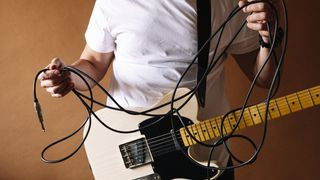 Man holding a guitar cable in his hands
Man holding a guitar cable in his hands
(Image credit: Getty Images)
Do I need a different cable for acoustic, electric, or bass guitar?
No, a specific cable type isn’t necessary for different instrument types. Electric guitars, acoustic guitars, and basses all utilize 1/4″ jack connections, making any standard instrument cable universally compatible. However, cable quality remains crucial regardless of instrument.
Consider whether a straight or angled jack suits your instrument’s output jack location. Face-mounted jacks often benefit from angled cables, while some acoustic guitars are too bulky for angled connections, making straight jacks preferable.
How long should a guitar cable last?
High-quality guitar cables are built for durability. With proper care, expect years of reliable use, at least a couple of years without issues. Premium cables utilize superior components and construction. Key factors include jack plug quality and cable material. Shielding around the cable core minimizes unwanted noise from cable movement.
What is cable capacitance?
Cable capacitance influences your tone. All cables possess capacitance, meaning they store a small electrical charge. Ideally, you want signal to flow unimpeded to your pedals and amplifier. Higher capacitance can attenuate high-end frequencies, resulting in less treble. Low capacitance cables preserve a fuller frequency response. While the difference might be subtle, it’s discernible.
What length guitar cable do I need?
Opt for the shortest usable guitar cable length. Similar to capacitance, longer cables can slightly roll off high frequencies. Consider your guitar and amplifier’s inherent tonal characteristics; you might want to subtly reduce treble, but generally, shorter, low-capacitance cables are preferred for optimal signal clarity.
How much should I spend on a guitar cable?
Generally, higher investment correlates with better product quality. Budget cables might seem tempting initially, but as the adage goes, “buy cheap, buy twice.” Inferior cables are prone to noise, degrade tone, and fail prematurely. The best guitar cables maintain your rig’s sonic integrity and withstand the demands of regular use.
What are guitar cables made of?
Manufacturers employ various materials, but copper is typically the core conductor. Gold-plated jack plugs, common on premium cables, offer minimal tonal impact but resist corrosion.
Are guitar cables balanced?
Guitar cables are unbalanced, rendering them susceptible to external interference and microphonic noise. This underscores the importance of quality cables, especially in complex pedalboard setups.
Guitar cables are mono, transmitting a single signal copy. This single-signal transmission makes them vulnerable to extraneous noise pickup. Balanced cables transmit two signal copies, with one inverted to cancel out noise.
Unfortunately, balanced cables are generally incompatible with guitar amplifiers, which require TS connectors, whereas balanced cables utilize TRS connectors. Balanced cables are common in applications like synthesizers, studio monitors, PA systems, microphones, and situations requiring cable runs exceeding 25 feet.
Can guitar cables cause buzz?
Buzzing can originate from any component in your signal chain, even external electrical devices. While not always the culprit, a guitar cable can indeed introduce noise.
Isolating the noise source requires testing each component individually, a time-consuming but necessary process. Buzzing can also accumulate across multiple pedals or cables. Check for interference from nearby electrical devices like computer monitors or mobile phones.
How We Choose
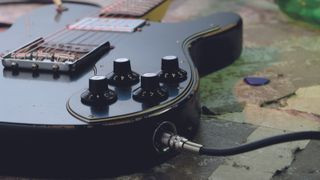 A guitar cable plugged into an electric guitar
A guitar cable plugged into an electric guitar
(Image credit: Future)Every Guitar World contributor is a practicing guitarist with extensive experience using a wide array of guitar cables across diverse playing scenarios – from festival stages to professional recording studios and regular rehearsals. We all prioritize optimal guitar tone.
For us, a top-tier guitar cable must excel in various applications, but sonic performance is paramount. Inferior cables introduce unwanted noise, which is unacceptable. Our initial test assesses noise performance, whether plugged directly into an audio interface or integrated into a full rig with amplifier and pedalboard.
Durability is the next critical factor. We subject cables to regular practice, tours, studio sessions, and home use to evaluate their resilience under constant use. Our collective experience allows us to quickly assess cable quality, particularly connector robustness, a common point of failure.
Guitar cable preference is subjective, but our real-world experience enables us to recommend cables suitable for the vast majority of players. As guitarists ourselves, we only endorse products we personally use and trust.
Learn more about our recommendation process and how we test products in our buyer’s guides and review policy.
Related Buyer’s Guides
